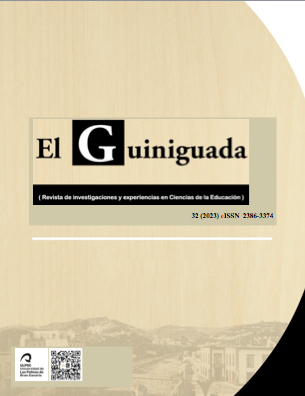Importance of Reading Comprehension for Virtual Education in Times of Pandemic
doi.org/10.20420/ElGuiniguada.2022.507
Keywords:
EDUCATIONAL RESEARCH; READING COMPREHENSION; BASIC GENERAL EDUCATION; URBAN AREA; RURAL AREA.Abstract
In the context of the COVID-19 pandemic, the purpose of this paper is to compare the frequency attributed to the importance of teaching reading comprehension and the use of methodological strategies by teachers in urban and rural areas of Manabí, Ecuador. The methodology is exploratory and descriptive, with a structured survey of 16 questions on the use of the methodology for teaching reading comprehension of Spanish as a first language, applied to 172 teachers of the seventh grade of General Basic Education in the study areas. When analyzing the frequencies of the data distributed by zones, statistically significant differences were detected informing that the teachers of the urban zone offer a different vision from the one of the rural zone in their perception of reading. These results lead to reflection on reading comprehension as one of the most important challenges for educational institutions, given the comprehension problems presented by Ecuadorian school graduates.
Downloads
References
Bernardo, T. & Yudelsi Z. (2016). Estrategia didáctica para el fomento de la lectura en las clases. EduSol, 16(55), 54-62. https://dialnet.unirioja.es/servlet/articulo?codigo=5678502
Castillo, C. V., Yahuita, Q. J., & Garabito, L. R. (2006). Estrategias docentes para un aprendizaje significativo. Cuadernos Hospital de Clínicas, 51(1), 96-101. http://www.scielo.org.bo/scielo.php?script=sci_arttext&pid=S1652-67762006000100015&lng=es&tlng=es.
Creamer, M., Maldonado, I., Chiriboga, A., Crespo, M., Rivera, G., & Flores, J. (2020). Currículo Priorizado. [Informe, Ministerio de Educación Subsecretaría de Fundamentos Educativos]. https://educacion.gob.ec/wp-content/uploads/downloads/2020/09/Curriculo-Priorizado-Sierra-Amazonia-2020-2021.pdf.
Gallego O. J., Figueroa S. S., & Rodríguez F. A. (2019). La comprensión lectora de escolares de educación básica. Literatura y lingüística, (40), 187-208. https://dx.doi.org/10.29344/0717621x.40.2066.
Figueroa, R. S., Poblete, A. J., Castro, R. M., Vargas, D. J., Joannon, A. O., & Escoffier, M. (2020). Impacto del COVID-19 en los resultados de aprendizaje y escolaridad en Chile. Revista de Educación, (391), 3-29. http://www.revistadeeducacion.cl/
Flotts, P., Manzi, J., Jiménez, D., Abarzúa, A., Cayuman, C., & García, M. (julio de 2015). Logros de aprendizaje. Laboratorio Latinoamericano de Evaluación de la Calidad de la Educación (p. 153). [Informe de resultados TERCE, UNESCO, OREALC] https://unesdoc.unesco.org/ark:/48223/pf0000243532_
Gómez, P. J. (2011). Comprensión lectora y rendimiento escolar: una ruta para mejorar la comunicación. Comunicación: Revista de Investigación en Comunicación y Desarrollo, 2(2), 27-36. https://dialnet.unirioja.es/descarga/articulo/3801085.pdf.
Jama, R. & Suárez, D. (2015). Estrategia metodológica para el desarrollo del pensamiento a través de los niveles de lectura. Medisan, 19(7), 861-867.
Mesquita, M. (2020). COVID-19 en la población pediátrica: ¿menor susceptibilidad y transmisibilidad? Pediatría (Asunción), 47(3), 121-123. https://dx.doi.org/10.31698/ped.47032020001.
Moreno, L. G., Muñoz, M., Maldonado, I., Creamer, M., Maldonado, I., Chiriboga, A., Yanza, F., Prado, S., & Broos, S. (2019). Rendición de Cuentas 2019. [Informe del Ministerio de Educación, Ecuador]. https://educacion.gob.ec/wp-content/uploads/downloads/2020/08/Informe-RC-2019-PC.pdf.
Ribadeneira, F. (2020). Estrategias didácticas en el proceso educativo de la zona rural. Onrado, 16(72), 16-72.
Torres, G. & Dávila, D. (2019). Estrategias didácticas para fortalecer fluidez y comprensión lectora en la educación rural. Rastros y Rostros del Saber, 3(4), 2-17.
UNESCO (Organización de las Naciones Unidas para la Educación, la Ciencia y la Cultura). (2020a). Lanzamiento Regional en línea para ALC de la Hoja de ruta EDS para 2030. [Informe, Educación Sector.] Santiago.
UNESCO (Organización de las Naciones Unidas para la Educación, la Ciencia y la Cultura). (2020b). La educación en tiempos de la pandemia de COVID-19. [Informe COVID-19 de la CEPAL-UNESCO]. Santiago.
Vallejo, R., Vidal, G., Rivadeneira, G., Benavídez, V., & Raza, G. (2008). SER Sistema Nacional de Evaluación y Rendición Social de Cuentas. [Informe del Ministerio de Educación, SER Ecuador]. https://educacion.gob.ec/wp-content/uploads/downloads/2013/04/sist_nac_evaluacion_ff.pdf.
Vallés, A. A. (2005). Compression lectors y process psicológicos. Liberabit, 11(11), 41-48. http://pepsic.bvsalud.org/scielo.php?script=sci_arttext&pid=S1729-48272005000100007&lng=pt&tlng=es.
Vera, D., Osses, S., & Schiefelbein, E. (2012). Las Creencias de los profesores rurales: una tarea pendiente para la investigación educativa. Estudios pedagógicos (Valdivia), 38(1), 297-310. https://dx.doi.org/10.4067/S0718-07052012000100018.
Vidal, M. D. & Manríquez, L. L. (2016). El docente como mediador de la comprensión lectora en universitarios. Revista de la educación superior, 45(177), 95-118. https://doi.org/10.1016/j.resu.2016.01.009.
Villagómez, S. (11 de agosto de 2020). Brecha entre educación rural y urbana crece sin parar; sí hay soluciones. [Mensaje en un blog]. https://lahora.com.ec/esmeraldas/noticia/1102324830/urge-plan-estatal-que-unifique-la-educacion-rural-y-urbana.
Williamson, G. (2004). Estudios sobre la educación para la población rural en Chile. En Educación para la población rural en Brasil, Chile, Colombia, Honduras, México, Paraguay y Perú. Proyecto FAO-UNESCO-DGCS/ITALIA-CIDE-REDUC. Roma: FAO-UNESCO.
Published
How to Cite
Issue
Section
License
Authors who publish with this journal agree to the following terms:
- Authors retain copyright and grant the journal right of first publication with the work simultaneously licensed under a Creative Commons Attribution License that allows others to share the work with an acknowledgement of the work's authorship and initial publication in this journal. You can not make a commercial use of the work. The use derived from the work is also not allowed.
- Authors are able to enter into separate, additional contractual arrangements for the non-exclusive distribution of the journal's published version of the work (e.g., post it to an institutional repository or publish it in a book), with an acknowledgement of its initial publication in this journal.
- Authors are permitted and encouraged to post their work online (e.g., in institutional repositories or on their website) prior to and during the submission process, as it can lead to productive exchanges, as well as earlier and greater citation of published work (See The Effect of Open Access).
















